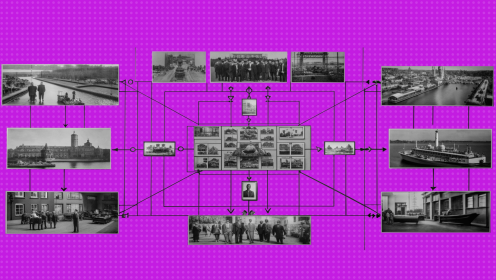In the second part of the project management guide, I explained how to create a project plan — a key element of organized work. But it's not enough to plan your work.The plan should not hang on the sidelines, it should be followed, keep up with deadlines, and so on. And this is where the most difficult part often begins…
6 tips on how not to deviate from the plan
When you have a plan and it's clear what to do and when to do it, it seems like a small matter. Specialists are involved in the work, and the Manager, in the meantime:
- monitors the load on employees;
- does not forget about the turnover;
- sets real deadlines so that you don't have to sit after the end of the working day;
- delegates and distributes responsibilities so that there are no situations when three or four employees are loaded to the very tomatoes and do not have time for anything, and the rest go idle.
But it often happens that the work was organized perfectly, but everything is not going according to plan. Why this happens and when you still need to succumb to external factors and change the plan, I will tell you later. In the meantime here are some tips on how to stick to the plan.
Make sure everyone is familiar with the plan
Everyone in the team should clearly understand what is required of them and when. Therefore, you need to introduce everyone to the plan and organize open access to important information - deadlines are often violated due to untimely data received.
It is bad when only one employee has access to the necessary files. Instead of working, he will spend a lot of time sending documents to colleagues, and they, in turn, will wait and lose precious time. In general, it is better to spend a little time organizing access at the very beginning than to solve problems later.
Update the plan as you complete it
While you are working on the project, certain conditions have probably already changed. For example, one task was completed faster, the second is still not finished, the third can not find a contractor, and the employee who was going to work on the fourth, fell ill and fell out of the workflow. In such circumstances, stubbornly following the original plan is the most stupid thing to do,which can lead to the failure of the project.
Update the schedule; note problems with deadlines; decide how to shift or shuffle tasks. If there are new tasks that you didn't immediately plan for, think about how to put them in the plan. If, on the contrary, some task was considered unimportant, distribute other tasks for the free time.
Mind if something has already gone wrong, you will have to adjust it a little so that everything does not fall apart at all. However, this does not mean that after the slightest deviation, you need to redo the entire project plan.
Interact with the entire team
Any project is a large-scale thing to one degree or another. It is unlikely that you will work on it alone, for sure there will be people with different specialties and tasks in the team. To clearly follow the plan, you need to communicate with everything regularly.
Constant contact between performers and managers (and maybe clients) will help keep everyone up to date, so that everyone knows what stage the work is at. At the same time, everyone should be well aware of the responsibilities of other project participants in order to quickly and at the address to ask for any comments or advice.
Track completion dates
And not only the project as a whole, but also each task separately. The deadlines are already set out in the plan, so now you need to monitor them and create conditions for everyone to meet them. Of course, if this is a reasonable, specific and achievable time frame.
If necessary, the deadlines for tasks can be reversed so that the backlog for one task does not stop work on the rest. But you should not relax your employees - everyone should be aware of the importance of deadlines and pass tasks on time.
Motivate your employees
In my experience, encouragement is better than punishment. A motivated employee, whose professional achievements are recognized and respected, works harder; tries to do more than you need to do according to the plan. Fines and penalties, on the contrary, often reduce motivation and spoil the working atmosphere in the team.
If the team consists of professionals who know that their efforts will be rewarded, they will do their job perfectly. They certainly won't break the plan and deadlines.
Don't try to schedule all your actions
It's enough that you set goals. Performers (if they are good specialists, of course) know very well what to do and how to do it. If you try to think through all the actions during the preparation of the plan and decide how to do this or that task, with a probability of 147%, the plan will fall apart.
In General, do not teach professionals (I hope your employees are professionals you trust, otherwise why do this at all), and then instead of a quality job you will get nervous employees and problems in the team.
Why the plan might fail
There are several reasons, but they are relatively easy to avoid. However, you will have to work on this from the very beginning, and not only when there is a real risk of failure.
- There are no clear project goals. No goals - no motivation-performers just don't know why to try. To avoid this, you need to define your goals "on the beach" and understand what the project will bring both to the team as a whole and to an individual employee.
- There are goals, but they are unrealistic. It is often advised to set goals higher than you initially expect, they say, this increases motivation. But you need to understand one simple thing: the higher the goal, the less opportunities to achieve it. In short, motivation is great, but it's not very wise to put a stick in your wheel.
- There are no interaction rules. Project participants do not know with whom it is necessary to discuss certain issues. If the interaction is not established, they may get lost in tasks, miss an important comment, and so on - all this reduces the quality and violates the deadlines.
- Resources are being allocated incorrectly. Any resources - time, budget, employees. This is the most difficult problem to avoid. Set the time with a margin, if the project deadlines allow. When assigning tasks, evaluate what each employee can do. Sometimes it is more important to give an employee a new task so that they have the necessary experience. And sometimes-the one that he has already done hundreds of times to be sure to be in time everywhere.
- No contingency plans. It may sound strange, but there's no getting away from it. Making a plan based on ideal conditions is like shooting yourself in the legs right away. If you know what problems there might be, you can plan your escape routes in advance. But this will only come with experience. So don't forget to record all the problems you encounter on projects - this can help you in the future.
In short, your work doesn't stop at creating a plan. This is just the beginning. Next, the most difficult thing is to avoid potential problems that can disrupt the plan, and follow the tips described above. Good luck!


















